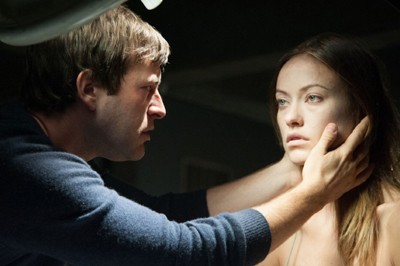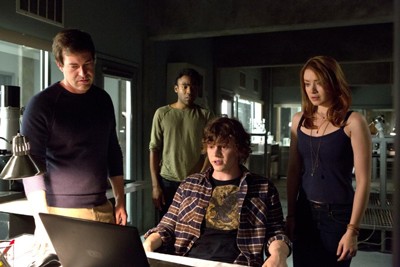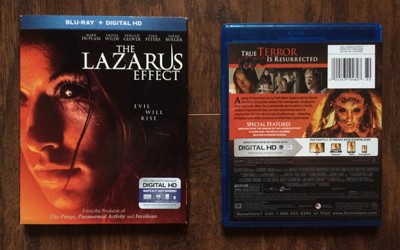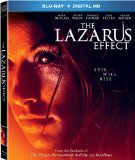| Reviews & Columns |
|
Reviews DVD TV on DVD Blu-ray 4K UHD International DVDs In Theaters Reviews by Studio Video Games Features Collector Series DVDs Easter Egg Database Interviews DVD Talk Radio Feature Articles Columns Anime Talk DVD Savant Horror DVDs The M.O.D. Squad Art House HD Talk Silent DVD
|
DVD Talk Forum |
|
|
| Resources |
|
DVD Price Search Customer Service #'s RCE Info Links |
|
Columns
|
|
|
Lazarus Effect, The
Fox // PG-13 // June 16, 2015
List Price: $39.99 [Buy now and save at Amazon]
The Film:
 As scientific research furthers our understanding of the secrets behind the way things work, so too does it provide fodder for science-fiction to explore current impossibilities in more credible -- or, at least, more informed -- ways. That even trickles down to schlocky indie flicks like The Lazarus Effect, an update on the theme of botched human resurrection popularized by the likes of Mary Shelley and H.P. Lovecraft. In the case of this biological horror-thriller from David Gelb, the director of the wonderful documentary Jiro Dreams of Sushi of all things, updated scientific gibberish leads into fairly interesting moral grounds as a group of med students "play God" by experimenting with reanimation of mammal bodies, creating an eerily morbid setting as the possibility of applying that research to humans creeps up. Alas, despite a promising start, the film ultimately uses the setting for feeble jolts and the outlandish exacerbation of scientific hokum, devolving into something that's as unscary as it is inane.
As scientific research furthers our understanding of the secrets behind the way things work, so too does it provide fodder for science-fiction to explore current impossibilities in more credible -- or, at least, more informed -- ways. That even trickles down to schlocky indie flicks like The Lazarus Effect, an update on the theme of botched human resurrection popularized by the likes of Mary Shelley and H.P. Lovecraft. In the case of this biological horror-thriller from David Gelb, the director of the wonderful documentary Jiro Dreams of Sushi of all things, updated scientific gibberish leads into fairly interesting moral grounds as a group of med students "play God" by experimenting with reanimation of mammal bodies, creating an eerily morbid setting as the possibility of applying that research to humans creeps up. Alas, despite a promising start, the film ultimately uses the setting for feeble jolts and the outlandish exacerbation of scientific hokum, devolving into something that's as unscary as it is inane.
In the depths of a medical university, a group of students have been working on a series of funded experiments, appropriately titled Lazarus Project, that have taken them close to solving life's greatest dilemma: bringing something back from the dead. Led by engaged doctors Frank (Mark Duplass) and Zoe (Olivia Wilde) who have set their lives aside until completion, the demanding project has progressed to a degree that they feel comfortable inviting a photojournalist, Eva (Sarah Bolger), to the lab in order to document their next steps. Eventually, they reach success in their experiments, but it comes at a price: the reanimated subjects come back with a hostile temperament. Before they're given a chance to pursue these new developments, the dean of students at their school demands them to shut down the research, forcing them into a rushed situation where they need to duplicate their findings. In the scramble, an accident claims the life of one of the researchers, Zoe, putting the others in the desperate position of testing their work on a human subject to reverse the damage ... and see what state she's in afterwards.
While some might be quick to pick apart the science involved in this resurrection process laid out by writers Luke Dawson and Jeremy Slater, the grounded mad-scientist concept in The Lazarus Effect generates a pulse of interest early on. Crafty scientific technobabble finds a way of transforming something similar to Herbert West's glowing green serum into a method that's ... uh, mildly conceivable, while the researchers discuss the breakthrough on philosophical terms befitting more sci-fi tendencies. There's nothing really new in their chats about science vs. religion and the morality behind bringing organisms back from the dead, save an interesting theory about DMT and its association with moving to the afterlife, but it establishes capable B-movie surroundings for an eerie climate. In fact, it would've been preferable to just see these sensibilities extend from start to finish, focused on lower-key, morbid scenarios and conflicts that would've sparked overzealous hubris in some and conservative resistance in others.
Unfortunately, David Gelb and his writers seem to think that The Lazarus Effect required a blatant catalyst to keep things moving along. A contrived mixture of school intervention and corporate maneuverings promptly weakens the film's foundation, relying on a capable cast to elevate the sloppy move through frantic developments. Mark Duplass and Olivia Wilde both commit to the scenario and display fine chemistry as the almost-married doctors with conflicting moral barometers -- especially Wilde's handling of the tormenting skeleton in her character's closet -- while Evan Peters and Donald Glover temper their idiosyncratic personalities into credible brainiacs with endearing personalities. Working against the holes that mount up around their availability to continue practicing their research, they all do a reasonable job of acting like intelligent individuals who are coerced into abandoning their intelligence for the sake of a morbid emotional cause. There's only so much that can be done with a comparatively mild situation that must produce a dead body, though, to which all involved are obligated to relinquish their ethical concerns.
in her character's closet -- while Evan Peters and Donald Glover temper their idiosyncratic personalities into credible brainiacs with endearing personalities. Working against the holes that mount up around their availability to continue practicing their research, they all do a reasonable job of acting like intelligent individuals who are coerced into abandoning their intelligence for the sake of a morbid emotional cause. There's only so much that can be done with a comparatively mild situation that must produce a dead body, though, to which all involved are obligated to relinquish their ethical concerns.
Up to this point, most of everything about The Lazarus Effect could've been tolerated had they justified those problem areas with an intriguing climax to their research, but that potential quickly dies once the extent of Gelb and Co.'s real objectives are revealed. Rote jump-scares, nonsensical dream sequences, and profoundly screwy logic transform the film into a zany twist on Luc Besson's Lucy with the "subject" changing into a puzzlingly spiteful antagonist with both psychic and telekinetic powers, armed with just enough unlocked capability to be menacing but not enough to breach the PG-13 limitations on this horror film. As a result, the fury unleashed by Zoe and what she "brings back" from the grave reduces the clever setting from a cautionary tale about science gone wrong to yet another disposable victim countdown in an isolated environment, one where the scares it attempts to deliver never get more effective than a scene earlier on featuring a pig mask and someone yelling "Boo!". Things were far more intriguing when The Lazarus Effect manipulated scientific principles and dabbled in the messiah complex.
The Blu-ray:
Video and Audio:
Most of The Lazarus Effect transpires within the gray walls and betwixt the metallic devices of the university's laboratory, captured with sterile digital photography that accentuates the openness and, when it's time, the dim shadows of the space. Fox Home Entertainment's 2.35:1-framed, 1080p AVC digital transfer hits the sharp lines of equipment, the folds of fabric, and the fine details of dog hair and skin texture quite appropriately. The visual texture shifts throughout from clean, standard shots to the coarseness of security footage and the faint lines visible through Eva's recording equipment, all of which also highlight the disc's impeccable array of detail. Color comes in splashes likely for the same reasons the researchers might implement them in the space, such as a bright orange couch and a colorful board game to break up emotionless gray boxes, injecting pleasant doses of convincing hues into the palette. Flesh tones are equally responsive and convincing, while contrast levels allow the darker corners of the laboratory to show details, though crush creeps in at a few spots. A few sequences outside of the facility -- in dream sequences and apartments -- capably harness more warmth. Everything here looks quite alive.
The Lazarus Effect's 5.1 DTS-HD Master Audio track rides a curious balance of quiet talkative sequences and abrupt loud freakout effects, both of which hit the right notes through Fox's aural treatment. Dialogue is incredibly well-balanced, clear as a whistle and amenable to the surrounding environment, with thick deeper vocals for the guys and a strong mid-range current through Olivia Wilde's verbal tempo. Small sound effects emerge from the track quite frequently, from the pulling of a necklace pendant along its links to the spilling of champagne suds on a tabletop, while the consistent sound of ambient fills the front and rear channels with a degree of precision that lets you know that it's coming from a record player. Of course, that's not all the sonic treatment has in store: the crunching of metal lockers, the flailing of an awakened dog, and those crass jump-scare noises are firm yet free of distortion. Some bass elements get a little bit too much rumble at times, but the track's an appropriate, shrewd digital handling of modern small-scale sound design.
Special Features:
Fox Home Entertainment have included a pair of better-than-expected featurettes for The Lazarus Effect, staring off with Creating Fear: The Making of The Lazarus Effect (14:26, 16x9 HD), which explores a standard press-kit arrangement of interviews and behind-the-scenes material in an in-depth fashion. The filmmakers and actors discuss making the science of the film feel real, the claustrophobia of the setting and how the actors built a bond through it, and some of the unsettling thematic material involving dreams, the afterlife, and being brought back from the dead. Branching off that last topic, Playing God (7:46, 16x9 HD) delves further into the topic of death and the balance between science and faith in the afterlife, underscored by interviews with both the filmmakers and "experts" in the field. Both pieces do their fair share of plot discussion and backslapping, as expected, but those interesed in the film's subject matter will find the way they talk about it worth the time to watch these featurettes.
Fox have also included a brief collection of Deleted/Extended Scenes (4:25, 16x9 HD), including a more violent version of a sequence that probably didn't make the PG-13 cut, as well as a Theatrical Trailer (2:15, 16x9 HD).
Final Thoughts:
There isn't anything particularly innovative about the first half of The Lazarus Project or anything, really, but its amiable characters and earnest attempt at grounding the science of human reanimation partially won me over, wishing that the tempo had continued through the film as an eerie thematic foundation. Unfortunately, the gears shift into straightforward, ludicrous horror territory later on, leaving subtlety and sensibility at the door as the focal resurrection turns into the origin point for cliche body-count cinema and outlandish pseudo-science. That'd be fine if the thrills actually, well, thrilled, but on-the-nose "gotcha" scares and restrained PG-13 stabs at gore really don't do the trick here, even though the script attempts to pull a more personal angle into it. Once all's said and done, The Lazarus Effect left me wishing that it had been a different film, a stronger science-fiction chiller with a subtly menacing tone, one it had every potential of being. Fox Home Entertainment's Blu-ray looks and sounds great, though, and its pair of featurettes are worth the time to check it out. Rent It.
Thomas Spurlin, Staff Reviewer -- DVDTalk Reviews | Personal Blog/Site
 As scientific research furthers our understanding of the secrets behind the way things work, so too does it provide fodder for science-fiction to explore current impossibilities in more credible -- or, at least, more informed -- ways. That even trickles down to schlocky indie flicks like The Lazarus Effect, an update on the theme of botched human resurrection popularized by the likes of Mary Shelley and H.P. Lovecraft. In the case of this biological horror-thriller from David Gelb, the director of the wonderful documentary Jiro Dreams of Sushi of all things, updated scientific gibberish leads into fairly interesting moral grounds as a group of med students "play God" by experimenting with reanimation of mammal bodies, creating an eerily morbid setting as the possibility of applying that research to humans creeps up. Alas, despite a promising start, the film ultimately uses the setting for feeble jolts and the outlandish exacerbation of scientific hokum, devolving into something that's as unscary as it is inane.
As scientific research furthers our understanding of the secrets behind the way things work, so too does it provide fodder for science-fiction to explore current impossibilities in more credible -- or, at least, more informed -- ways. That even trickles down to schlocky indie flicks like The Lazarus Effect, an update on the theme of botched human resurrection popularized by the likes of Mary Shelley and H.P. Lovecraft. In the case of this biological horror-thriller from David Gelb, the director of the wonderful documentary Jiro Dreams of Sushi of all things, updated scientific gibberish leads into fairly interesting moral grounds as a group of med students "play God" by experimenting with reanimation of mammal bodies, creating an eerily morbid setting as the possibility of applying that research to humans creeps up. Alas, despite a promising start, the film ultimately uses the setting for feeble jolts and the outlandish exacerbation of scientific hokum, devolving into something that's as unscary as it is inane. In the depths of a medical university, a group of students have been working on a series of funded experiments, appropriately titled Lazarus Project, that have taken them close to solving life's greatest dilemma: bringing something back from the dead. Led by engaged doctors Frank (Mark Duplass) and Zoe (Olivia Wilde) who have set their lives aside until completion, the demanding project has progressed to a degree that they feel comfortable inviting a photojournalist, Eva (Sarah Bolger), to the lab in order to document their next steps. Eventually, they reach success in their experiments, but it comes at a price: the reanimated subjects come back with a hostile temperament. Before they're given a chance to pursue these new developments, the dean of students at their school demands them to shut down the research, forcing them into a rushed situation where they need to duplicate their findings. In the scramble, an accident claims the life of one of the researchers, Zoe, putting the others in the desperate position of testing their work on a human subject to reverse the damage ... and see what state she's in afterwards.
While some might be quick to pick apart the science involved in this resurrection process laid out by writers Luke Dawson and Jeremy Slater, the grounded mad-scientist concept in The Lazarus Effect generates a pulse of interest early on. Crafty scientific technobabble finds a way of transforming something similar to Herbert West's glowing green serum into a method that's ... uh, mildly conceivable, while the researchers discuss the breakthrough on philosophical terms befitting more sci-fi tendencies. There's nothing really new in their chats about science vs. religion and the morality behind bringing organisms back from the dead, save an interesting theory about DMT and its association with moving to the afterlife, but it establishes capable B-movie surroundings for an eerie climate. In fact, it would've been preferable to just see these sensibilities extend from start to finish, focused on lower-key, morbid scenarios and conflicts that would've sparked overzealous hubris in some and conservative resistance in others.
Unfortunately, David Gelb and his writers seem to think that The Lazarus Effect required a blatant catalyst to keep things moving along. A contrived mixture of school intervention and corporate maneuverings promptly weakens the film's foundation, relying on a capable cast to elevate the sloppy move through frantic developments. Mark Duplass and Olivia Wilde both commit to the scenario and display fine chemistry as the almost-married doctors with conflicting moral barometers -- especially Wilde's handling of the tormenting skeleton
 in her character's closet -- while Evan Peters and Donald Glover temper their idiosyncratic personalities into credible brainiacs with endearing personalities. Working against the holes that mount up around their availability to continue practicing their research, they all do a reasonable job of acting like intelligent individuals who are coerced into abandoning their intelligence for the sake of a morbid emotional cause. There's only so much that can be done with a comparatively mild situation that must produce a dead body, though, to which all involved are obligated to relinquish their ethical concerns.
in her character's closet -- while Evan Peters and Donald Glover temper their idiosyncratic personalities into credible brainiacs with endearing personalities. Working against the holes that mount up around their availability to continue practicing their research, they all do a reasonable job of acting like intelligent individuals who are coerced into abandoning their intelligence for the sake of a morbid emotional cause. There's only so much that can be done with a comparatively mild situation that must produce a dead body, though, to which all involved are obligated to relinquish their ethical concerns. Up to this point, most of everything about The Lazarus Effect could've been tolerated had they justified those problem areas with an intriguing climax to their research, but that potential quickly dies once the extent of Gelb and Co.'s real objectives are revealed. Rote jump-scares, nonsensical dream sequences, and profoundly screwy logic transform the film into a zany twist on Luc Besson's Lucy with the "subject" changing into a puzzlingly spiteful antagonist with both psychic and telekinetic powers, armed with just enough unlocked capability to be menacing but not enough to breach the PG-13 limitations on this horror film. As a result, the fury unleashed by Zoe and what she "brings back" from the grave reduces the clever setting from a cautionary tale about science gone wrong to yet another disposable victim countdown in an isolated environment, one where the scares it attempts to deliver never get more effective than a scene earlier on featuring a pig mask and someone yelling "Boo!". Things were far more intriguing when The Lazarus Effect manipulated scientific principles and dabbled in the messiah complex.
The Blu-ray:
 |  |
Video and Audio:
Most of The Lazarus Effect transpires within the gray walls and betwixt the metallic devices of the university's laboratory, captured with sterile digital photography that accentuates the openness and, when it's time, the dim shadows of the space. Fox Home Entertainment's 2.35:1-framed, 1080p AVC digital transfer hits the sharp lines of equipment, the folds of fabric, and the fine details of dog hair and skin texture quite appropriately. The visual texture shifts throughout from clean, standard shots to the coarseness of security footage and the faint lines visible through Eva's recording equipment, all of which also highlight the disc's impeccable array of detail. Color comes in splashes likely for the same reasons the researchers might implement them in the space, such as a bright orange couch and a colorful board game to break up emotionless gray boxes, injecting pleasant doses of convincing hues into the palette. Flesh tones are equally responsive and convincing, while contrast levels allow the darker corners of the laboratory to show details, though crush creeps in at a few spots. A few sequences outside of the facility -- in dream sequences and apartments -- capably harness more warmth. Everything here looks quite alive.
The Lazarus Effect's 5.1 DTS-HD Master Audio track rides a curious balance of quiet talkative sequences and abrupt loud freakout effects, both of which hit the right notes through Fox's aural treatment. Dialogue is incredibly well-balanced, clear as a whistle and amenable to the surrounding environment, with thick deeper vocals for the guys and a strong mid-range current through Olivia Wilde's verbal tempo. Small sound effects emerge from the track quite frequently, from the pulling of a necklace pendant along its links to the spilling of champagne suds on a tabletop, while the consistent sound of ambient fills the front and rear channels with a degree of precision that lets you know that it's coming from a record player. Of course, that's not all the sonic treatment has in store: the crunching of metal lockers, the flailing of an awakened dog, and those crass jump-scare noises are firm yet free of distortion. Some bass elements get a little bit too much rumble at times, but the track's an appropriate, shrewd digital handling of modern small-scale sound design.
Special Features:
Fox Home Entertainment have included a pair of better-than-expected featurettes for The Lazarus Effect, staring off with Creating Fear: The Making of The Lazarus Effect (14:26, 16x9 HD), which explores a standard press-kit arrangement of interviews and behind-the-scenes material in an in-depth fashion. The filmmakers and actors discuss making the science of the film feel real, the claustrophobia of the setting and how the actors built a bond through it, and some of the unsettling thematic material involving dreams, the afterlife, and being brought back from the dead. Branching off that last topic, Playing God (7:46, 16x9 HD) delves further into the topic of death and the balance between science and faith in the afterlife, underscored by interviews with both the filmmakers and "experts" in the field. Both pieces do their fair share of plot discussion and backslapping, as expected, but those interesed in the film's subject matter will find the way they talk about it worth the time to watch these featurettes.
Fox have also included a brief collection of Deleted/Extended Scenes (4:25, 16x9 HD), including a more violent version of a sequence that probably didn't make the PG-13 cut, as well as a Theatrical Trailer (2:15, 16x9 HD).
Final Thoughts:
There isn't anything particularly innovative about the first half of The Lazarus Project or anything, really, but its amiable characters and earnest attempt at grounding the science of human reanimation partially won me over, wishing that the tempo had continued through the film as an eerie thematic foundation. Unfortunately, the gears shift into straightforward, ludicrous horror territory later on, leaving subtlety and sensibility at the door as the focal resurrection turns into the origin point for cliche body-count cinema and outlandish pseudo-science. That'd be fine if the thrills actually, well, thrilled, but on-the-nose "gotcha" scares and restrained PG-13 stabs at gore really don't do the trick here, even though the script attempts to pull a more personal angle into it. Once all's said and done, The Lazarus Effect left me wishing that it had been a different film, a stronger science-fiction chiller with a subtly menacing tone, one it had every potential of being. Fox Home Entertainment's Blu-ray looks and sounds great, though, and its pair of featurettes are worth the time to check it out. Rent It.
|
| Popular Reviews |
| Sponsored Links |
|
|
| Sponsored Links |
|
|
| Release List | Reviews | Shop | Newsletter | Forum | DVD Giveaways | Blu-Ray | Advertise |
|
Copyright 2024 DVDTalk.com All Rights Reserved. Legal Info, Privacy Policy, Terms of Use,
Manage Preferences,
Your Privacy Choices | |||||||













